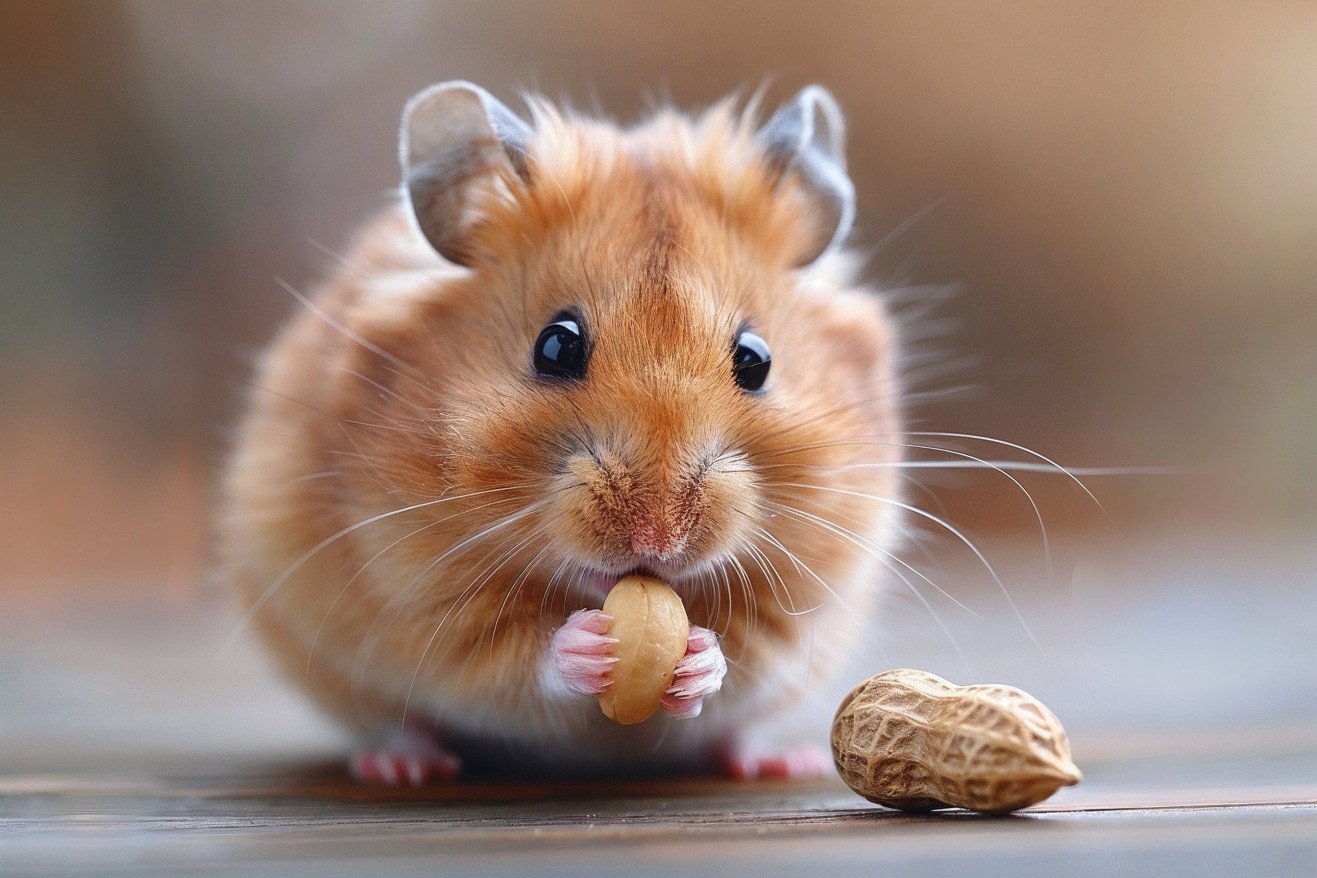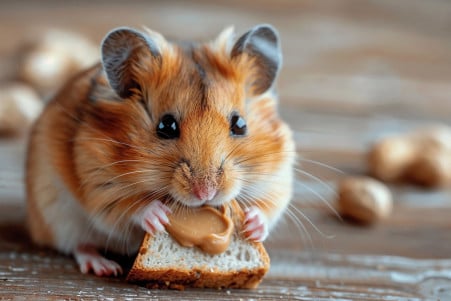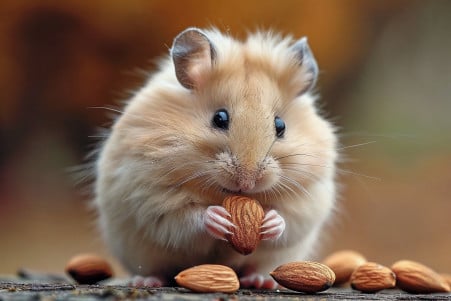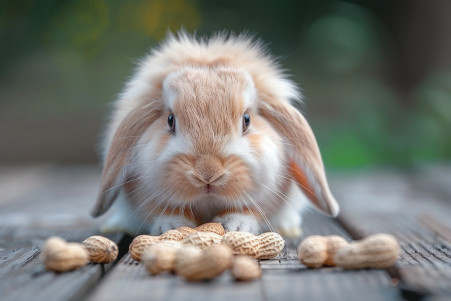Can Hamsters Eat Peanuts? Nutrition Facts and Safe Serving Tips
13 April 2024 • Updated 13 April 2024

Peanuts can be a delicious snack for hamsters, but it's important to know the nutritional facts and serving guidelines to make sure your pet is getting the best care. Hamsters can eat peanuts, but they should be limited to an occasional treat because they are high in fat. Overconsumption of peanuts can lead to obesity and other health problems in hamsters. A good rule of thumb is to limit your hamster to two unsalted peanuts per week.
Drawing on evidence from veterinarians, animal nutritionists, and seasoned hamster enthusiasts, we'll explore the best practices for feeding peanuts and other nuts to your hamster. From serving sizes to preparation techniques to potential allergic reactions, you'll learn the information you need to help your hamster live its best life while still enjoying the occasional nut.
Can hamsters eat peanuts?
How to Add Peanuts to a Healthy Hamster Diet
Since hamsters are omnivores, their diet should be well-rounded and include a mix of pellets/seeds, fresh fruits and vegetables, and the occasional treat, such as peanuts. According to Rachel Got Hamsters, a good rule of thumb for a healthy hamster diet is to make sure that 75% of their food is pellets/seeds, 20% is fresh fruits and vegetables, and 5% is treats. Peanuts can be a great treat, but they are high in fat, so it's important to make sure that they don't make up too much of the treat portion of the diet, which could lead to obesity and other health problems, according to The Spruce Pets.
When you add a new food to your hamster's diet, including peanuts, it's important to do so slowly and in moderation to avoid upsetting your hamster's stomach. WikiHow suggests that you start by adding a small amount of the new food to your hamster's regular diet and then watch your hamster to see how they react. Some hamsters may be allergic or sensitive to peanuts, so it's important to look for any signs of an allergic reaction. By making sure that peanuts are a small part of a well-rounded diet and are given to your hamster in moderation, you can make sure that your hamster can enjoy peanuts without putting their health at risk.
Other Healthy Treats for Hamsters Besides Peanuts
In addition to peanuts, there are a number of other treats that hamsters can eat in moderation that are safe and healthy. The PDSA lists fruits and vegetables that are safe for hamsters to eat as apples, bananas, berries, carrots, broccoli, and leafy greens such as spinach and romaine lettuce. Small Pet Select also recommends whole grains, seeds, and the occasional protein such as cooked chicken or eggs as healthy treats for hamsters.
That said, it's important to stay away from human foods that are high in sugar, salt, or fat, as well as fruits and vegetables that are toxic to hamsters, which are listed by Petco. Offering a mix of safe treats can help make sure your hamster's diet is well-rounded and keep them from getting bored or developing picky eating habits.
Serving Sizes and Feeding Amounts for Hamsters
The Ontario Hamster Club suggests that a good rule of thumb for fresh foods is to think of a portion as the size of your hamster's ear. Meanwhile, hamsters have small stomachs and typically only need 1-2 tablespoons of food per day, which can vary based on the hamster's size and activity level, according to PetHelpful. For treats like peanuts, a portion the size of a small teaspoon is recommended.
Since overfeeding can lead to obesity, digestive problems, and other health issues, it's important to be mindful of how much your hamster is eating. Omlet notes that if you find a lot of dry food in the bedding, you're likely feeding too much. On the other hand, if the food is disappearing quickly, you can probably increase the portion a little bit.
Pregnant and lactating hamsters may need a little more food and protein to help them meet their increased nutritional needs. That said, make sure that you're keeping an eye on your hamster's eating habits and adjusting their portions as needed to make sure that they're maintaining a healthy weight. By following these serving sizes, you can make sure that your hamster is getting the right amount of nutrients without overeating.
Symptoms of Malnutrition and How to Address Feeding Problems
Hamsters that have lost their appetite or have stopped eating and drinking altogether may be suffering from an illness or malnutrition, according to Omlet. Other signs of illness like lethargy, a scruffy coat, and diarrhea, as mentioned by Healthy Pet, can also be linked to malnutrition.
Make sure that your hamster has access to fresh food and water and that there are no blockages preventing them from eating or drinking. If you notice that your hamster has stopped eating or drinking, make sure to take them to the vet immediately, as it can be life-threatening, according to the experts at Omlet.
Feeding your hamster a well-rounded diet and paying close attention to their eating habits can help you avoid malnutrition and overfeeding. By keeping an eye out for changes in their behavior and physical appearance, you can make sure to catch feeding problems early and keep your hamster healthy and happy.
Keeping Your Hamster's Cage Clean and Healthy
Keeping your hamster's habitat clean is important for their health. As explained by Forever Vets, you should change your hamster's bedding at least once a week and spot clean soiled areas every day. Meanwhile, the Spruce Pets says that you should clean and disinfect the entire cage at least once a month.
When cleaning the cage, make sure to use pet-friendly cleaning products and dry the cage completely before returning your hamster to it, according to the Fort Myers Vet. Keeping your hamster's habitat clean and free of odors can help prevent respiratory and other health issues, according to the experts at Kaytee.
By making sure you stay on top of these cage cleaning recommendations, you can ensure that your hamster has a clean, comfortable, and healthy place to live. Not only will this help them stay healthy, but it will also help you avoid health issues in the future.
Conclusion: Moderation and Balance for a Happy, Healthy Hamster
Peanuts can be a safe and nutritious treat for hamsters when fed in moderation and without any added flavors or salt. According to Hepper, peanuts provide health benefits for hamsters, but they must be kept plain and fed in small amounts to avoid issues like obesity, digestive problems, and dehydration from excess salt.
A balanced diet consisting of high-quality pellets, fresh produce, and occasional treats like peanuts is essential for a hamster's health. As recommended by The Spruce Pets, a hamster's diet should be approximately 75% pellets/seeds, 20% fresh foods, and 5% treats. Proper portion control and monitoring eating habits are key to ensuring your hamster's well-being.
While peanuts can be a tasty snack, variety and moderation are crucial to preventing health problems. PetMD advises that hamsters can enjoy a range of safe fruits, vegetables, and other treats in addition to peanuts, as long as they are provided in appropriate amounts. By following these guidelines, you can safely incorporate peanuts and other healthy treats into your hamster's diet for a happy, healthy pet.


